Two months ago, LexisNexis announcing its planned launch of a premium legal research service, Lexis+, which it said would take a bold approach to providing legal research, AI-driven analytics and practical guidance within a unified and fully integrated platform.
As I reported at the time, the company positioned the new service not as a successor to its current research platform, Lexis Advance, but rather as a higher-end alternative designed for users who want an all-in-one, end-to-end platform that incorporates the latest powerhouse technologies, including several that are unique to this product.
Today marks the official commercial launch of Lexis+, and LexisNexis allowed me an opportunity to test it in advance. I’ll share my experience below, but first let me recap what the product offers and how it differs from Lexis Advance. Please also refer back to my July post, which goes into additional detail on several of these points.
With Lexis+, LexisNexis combines three key features within a single platform: its most advanced legal research tools; enhanced Practical Guidance, the new name for what was previously called Practice Advisor; and the introduction of Brief Analysis. These are accessed through a navigation bar on the left called the Experience Dock, and LexisNexis refers to each of these three main features as “Experiences.”
Lexis+ also offers what LexisNexis describes as “dramatic visual styling” and a simplified layout intended to “set a new standard” in ease of use.
“Striking imagery, bold colors and typography improve readability, reduce visual ‘clutter’ and emphasize essential information and tasks,” LexisNexis says.
Several of the features of Lexis+ are new to this platform and had not been available in Lexis Advance. Most notable among these new features:
- Brief Analysis. This is LexisNexis’s answer to a line of products pioneered by legal research company Casetext with its CARA brief analysis tool and followed by companies such as Thomson Reuters and Bloomberg Law.
- Search Tree. A new search feature that displays visually how the terms in a terms-and-connectors or Boolean search were applied and how those relationships impacted the results. Whereas in Lexis Advance you would not know how your search terms were applied, in Lexis+ the Search Tree shows you.
- Missing and Must Include. Another new search feature, it highlights terms from your search query that are missing from a specific document in the results set, without having to open the document. When you see a “missing” term at the bottom of the search-results snippet, you can select “Must Include” to rerun the search and force inclusion of that term.
- Shepard’s At Risk. This new feature identifies cases that are at risk of being overruled, even if they have not been directly. It flags cases in which the underlying points of law on which they rely have been negatively treated by other decisions in the same jurisdiction, which would suggest it is at risk.
In addition to those new features, Lexis+ provides enhanced versions of other features and tools:
- Practical Guidance. LexisNexis Practical Guidance is a collection of practice-specific forms, clauses, checklists, articles and practice notes designed to help a legal professional get up to speed more quickly on a particular matter. While Practical Guidance is also available in Lexis Advance, LexisNexis says it is now more tightly integrated throughout Lexis+.
- Lexis Answers. This feature responds to natural language search queries with the best, most relevant answer, taking the user directly to its location within the document. In Lexis+, the feature has been completely redesigned with the latest machine learning capabilities, LexisNexis says, offering expanded and more relevant answers across wider question categories and automatic jurisdiction detection.
- Code Compare. With this feature, a user can compare two versions of any state or federal statute side-by-side, including current, future and archival versions dating back to the early 1990s.
- Legislative Outlook. A feature that predicts the passage of pending federal and state legislation.
- Ravel View. A research feature that provides visualizations that show the relationships between cases.
“Lexis+ was designed for the ways that attorneys work, with deeply integrated product components, cutting-edge technologies and modern design elements that put the LexisNexis applications, content and data that attorneys need right at their fingertips,” said Jeff Pfeifer, chief product officer at LexisNexis North America, in announcing today’s launch. “Regardless of where or how a user starts a research or task, they will be guided to the information that best addresses their legal question.”
Testing It Out
As I mentioned above, LexisNexis provided me with early access to Lexis+. Here are some of my impressions.
You start your research at a landing page where you can select from the three “Experiences” I described above: Legal Research, Practical Guidance and Brief Analysis. This page also allows the user to easily select categories and jurisdictions to search, as well as drill down into types of content, sources, topics, and more.
When I spoke to Pfeifer back in July, he said that the Lexis+ search tool is designed to balance two interests — making maximum use of artificial intelligence and machine learning capabilities while also allowing researchers to maintain the ability to control and customize their searches.
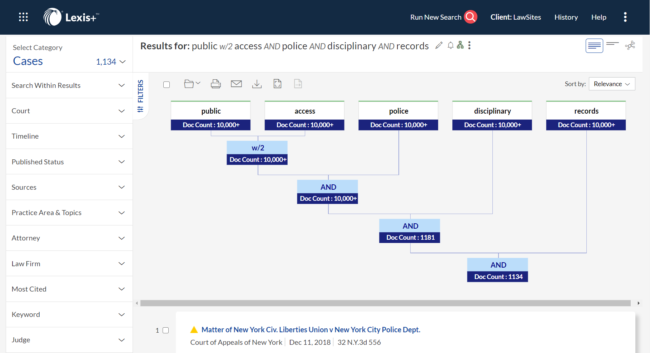
One way it does this is through the new Search Tree feature I described above. When you conduct a terms-and-connectors or Boolean search, it provides a visual display of how your search terms were applied and how those relationships impacted the results. (It does not work with natural language searches.)
In the standard Lexis Advance, you would not know how your search terms were applied. In Lexis+ the Search Tree shows you. Each part of the search is represented in a box that displays how many results would be retrieved if only that part of the search was run. Select any of the boxes to refresh the results with those search terms.

Another new feature intended to give users greater control over their searches is called Missing and Must Include. It highlights terms from your search query that are missing from a specific document in the results set, without having to open the document.
As you can see in the image above, if a result does not include one or more of your search terms, then this omission is shown at the bottom of the search-results snippet. If you want to force inclusion of that term, you can then select “Must Include” to rerun the search.
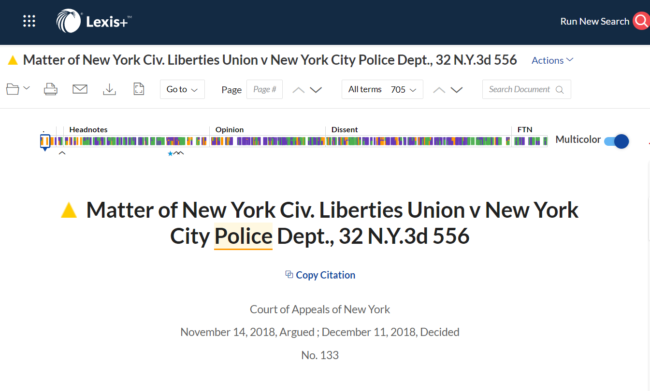 The multicolor search term map shows the locations and distribution of your search terms.
The multicolor search term map shows the locations and distribution of your search terms.
Another feature that is included in the version rolling out today is an expanded version of Search Terms Maps. These maps show the location and distribution of your search terms both within the results list and within the full text of documents. You can use this to identify where in a document are the largest concentrations of your search terms or to navigate to points in document where specific terms appear.
According to Lexis Nexis, Lexis+ expands this feature, which in Lexis Advance was available only in case law, to more than 30 content types, including news, statutes and legislation, administrative codes, secondary materials, administrative materials, and litigation documents.
New Shepard’s At Risk
A new feature included within Lexis+ is Shepard’s At Risk. It identifies cases that are at risk of being overruled, even if they have not directly been. It flags cases in which the underlying points of law on which they rely have been negatively treated by other decisions in the same jurisdiction, which would suggest it is at risk.
This feature is similar in concept to the enhanced citator Thomson Reuters introduced two years ago as part of its roll-out of Westlaw Edge, which likewise identified cases that may no longer be good law, even when there is no direct citation relationship between the case at hand and the case that possibly invalidated it.

In an example provided by LexisNexis, a Georgia case, Durrah v. State Farm Fire & Cas., 312 Ga. App. 49 (2011), shows up in Lexis+ with a red label, “At Risk,” even though the case has not directly been overruled or discussed negatively by other decisions. However, for a specific point of law, the case relies on another decision which has been overruled.
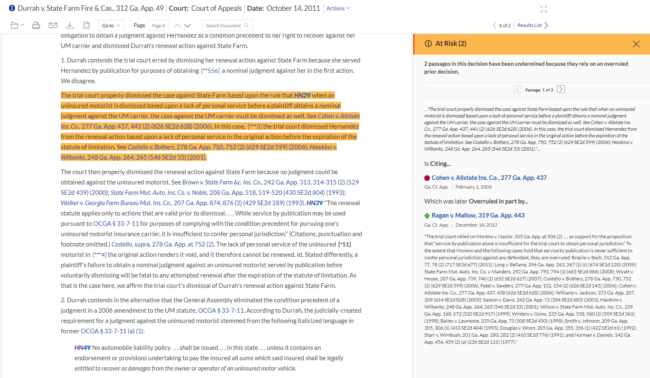
The At Risk feature highlights the text of the passage in question and displays alongside it that cases that give rise to the risk.
Lexis Answers
The Lexis Answers tool, which LexisNexis says has been completely redesigned for Lexis+, uses semantic analysis to understand the meaning of what you’re asking. The idea of is to provide on-point answers, with citable authority, to natural-language legal questions, without the researcher having to comb through extensive search results.
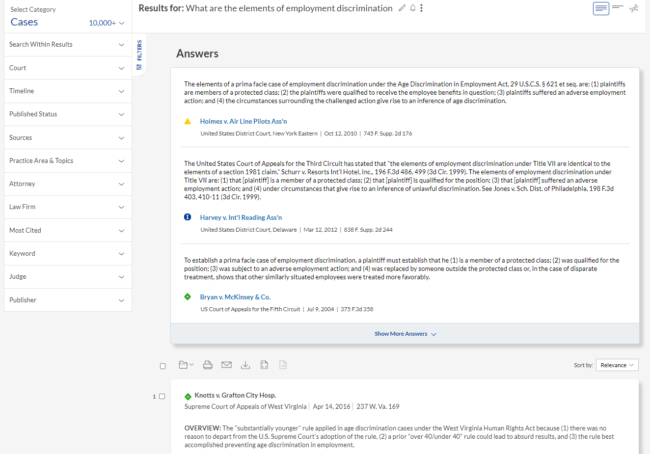
I entered the query, “What are the elements of employment discrimination?” The results page showed the top three answers, and I could click Show More Answers to see additional results. Below the answers, it shows case results as it would for a typical research query.
Each answer displays text from the case that is relevant to the question, as well as the court where the case was decided, the date it was decided, and the citation. Click on the answer to go to the exact location within the case where the answer text is found.
Code Compare
Another feature included within Lexis+ is Code Compare. It allows a user to compare two versions of any state or federal statute — such as the current version and the immediate prior version — with additions shown in green and deletions shown in red.
When viewing a statute, you would use this feature by clicking on the compare versions button. By default, it will compare the most current version with the most recently archived version, but the user can select to compare any two versions, going back to 1991.
I used it to compare current and prior versions of Massachusetts statutes. It is easy to use — just select the two versions to compare from a drop-down and the redlined comparison is shown, along with a heat map showing where additions and deletions occurred.
Brief Analysis
LexisNexis is a bit late to the game with a brief analysis tool. Ever since the 2016 launch by Casetext of its CARA brief-analysis tool, brief analysis has become the new vogue. Last year, Thomson Reuters, unveiled its version, called Quick Check, and in February, Bloomberg Law released its Brief Analyzer.
The idea of these tools is to help you find cases that are relevant to the brief but not cited. This can serve as a quality check on your own research or as a way of reviewing an opponent’s brief.
 Upload a PDF or Word brief to launch the brief analyzer.
Upload a PDF or Word brief to launch the brief analyzer.
With the Lexis+ version, you upload a brief, and it helps you find both targeted research recommendations and Shepard’s analysis, based on the citation patterns and legal concepts found in your document.
I uploaded an amicus brief I filed last year in the Massachusetts Supreme Judicial Court. After scanning the document for viruses, the tool took just a few seconds to produce its analysis.

As you can see, the tool creates a dashboard that shows its analysis of the document and research recommendations. This includes a breakdown of the core concepts extracted from the document, key passages identified, similar briefs, and Shepard’s analysis of cites in your document.
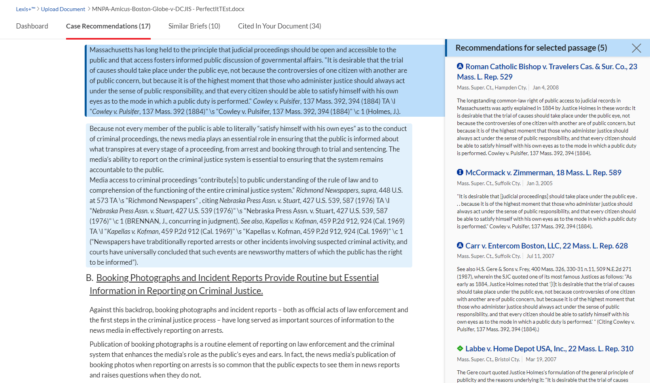
By clicking on the Case Recommendations tab, I am taken to a page that shows the key passages in my brief and the number of recommended cases related to those passages. By clicking on a passage, I can see the cases recommended for that passage.
The analyzer also shows other briefs that may be relevant to the one you are analyzing, highlighting matching legal concepts and cites for each of the recommended briefs.
Practical Guidance
 Selecting the Practical Guidance button on the left brings up a page that asks, ‘What task would you like to accomplish today?’
Selecting the Practical Guidance button on the left brings up a page that asks, ‘What task would you like to accomplish today?’
LexisNexis Practical Guidance is a collection of practice-specific forms, clauses, checklists, articles and practice notes designed to help a legal professional get up to speed more quickly on a particular matter. All subscribers to Lexis+ will get access to one Practical Guidance collection and can add others as desired.
In Lexis+, Practical Guidance is now fully integrated, both as its own “experience” and throughout research results. To search Practical Guidance materials, select that “experience” from the home page, or start a search and select Practical Guidance results, or browse by practice area, content type or other parameters.
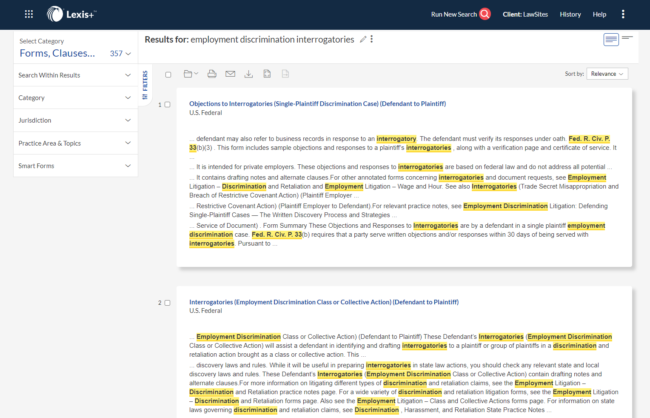
In this example, I searched for employment discrimination interrogatories. The search initially showed practice notes, which provided a number of general resources relating to employment discrimination litigation, but not about interrogatories. But when I selected the “Forms, Clauses and Checklists” category, I found results specific to my query.
A New Name for Lexis Advance
With its launch of Lexis+, LexisNexis says it has no immediate plan to eliminate or phase out Lexis Advance. “There will be no phase-out of Advance in the near term,” Pfeifer told me in July. “We will see how the market embraces this new solution and then see how that impacts the longer-term life of Advance.”
However, the company is retiring the “Advance” name from all U.S. products and Lexis Advance will now be called simply Lexis.
In addition, as noted above, Lexis Practice Advisor has been renamed Practical Guidance in the U.S. and Canada. The company says these changes reflect the positioning of Lexis as the standard research service and Lexis+ as the premium offering.
Future Plans for Lexis+
Future plans for Lexis+ include new features, content and product integrations. Later this year, LexisNexis expects to integrate Lex Machina analytics, Courtlink, and other tools. Early next year, content from Law360 will be incorporated into the platform.
My Thoughts
When I wrote about Lexis+ in July, after having been given a demonstration but not having tried it myself, I said this:
“Having not yet been hands-on with Lexis+, I can say only that, based on the demonstration, it certainly has a compelling design and introduces a number of useful features. The platform will likely be much more compelling once it integrates other core LexisNexis products such as Lex Machina, CourtLink, and Law360.”
Having now used it myself, I think the most-compelling reason to use the more expensive Lexis+ over Lexis Advance is the tight integration within a single platform of the three components — research, Practical Guidance and Brief Analysis.
Back in July, Pfeifer told me this tight integration was an overarching goal in creating Lexis+, with the aim of producing what he described as “a deeply complementary and integrated product experience.”
The basic experience of conducting legal research in Lexis+ is not all that different from Lexis Advance. But the added features that I described above — Search Tree, Missing and Must Include, Search Term Maps, and Ravel View — are valuable in that they give researchers more control over their searches and results without requiring them to be power researchers.
The integration of both Practical Guidance and Brief Analysis is a strong point of Lexis+. While Practical Guidance was already available in Lexis Advance, Lexis+ makes it easier to come at from different directions, including diving directly into a topic or discovering it through research results.
With regard to Brief Analysis, products of this sort are valuable to litigators, enabling them to check their own work product and analyze their opponent’s. Given that other major research services already offer this, it is all the more essential for lawyers to have access to it and, therefore, for Lexis to offer it.
But I will say again what I said in July, which is that I have to wonder what customers will think, and how they will respond, as LexisNexis asks them to choose between two legal research platforms, Lexis and Lexis+. To the extent that Lexis+ has advanced research tools to give users greater control, and to the extent is offers essential features such as Brief Analysis, it is the preferable of the two platforms.
Ultimately, the determinative factor in whether to stick with Lexis or move to Lexis+ will be the price differential. Unfortunately, LexisNexis will not reveal pricing to the public. You know the drill: If you want to know the price, you need to speak to a sales representative. That is a critical piece of information, without which no comparison can be complete.
My impression, after a short period of testing, is that LexisNexis has achieved its goals with Lexis+, designing a platform that is intuitive to use, more modern in its design, and with features that give users greater controls. To me, the biggest question about whether to move would be the cost. Maybe someday, LexisNexis (and Thomson Reuters) will be more transparent about this.




 Olga V. Mack is the CEO of
Olga V. Mack is the CEO of 






 The multicolor search term map shows the locations and distribution of your search terms.
The multicolor search term map shows the locations and distribution of your search terms.


 Upload a PDF or Word brief to launch the brief analyzer.
Upload a PDF or Word brief to launch the brief analyzer.

 Selecting the Practical Guidance button on the left brings up a page that asks, ‘What task would you like to accomplish today?’
Selecting the Practical Guidance button on the left brings up a page that asks, ‘What task would you like to accomplish today?’

 Kathryn Rubino is a Senior Editor at Above the Law, and host of
Kathryn Rubino is a Senior Editor at Above the Law, and host of 




